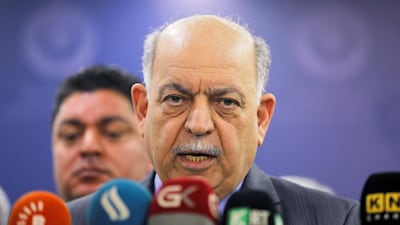Iraq, Opec’s second largest producer, will remain compliant with the alliance’s production cuts for the second half of the year, despite concerns about the threat to oil supply from escalating tensions in the Middle East.
"Iraq, as the second largest producer in Opec, confirms its commitment to the cut agreement by implementing a plan to reduce oil production," energy minister Thamir Ghadhban told a petroleum conference in London.
Production had reached 5 million barrels per day, including output from the semi-autonomous Kurdistan Region of Iraq, he added.
"However, we are really committed to the level of production with the Opec agreement," he said.
Iraq's production reached 4.725 million bpd for the month of May according to secondary sources cited by Opec in its monthly report.
Opec+ as the alliance correcting oil supply is known will meet in Vienna early July to discuss extension of output curbs. The alliance, which is headed by Saudi Arabia and non-member Russia has been cutting 1.2 million bpd of output since January. The alliance's key producer Saudi Arabia is keen to extend the cuts, in order to draw back some of the high inventory levels due to record production in the US. Leaders of the two countries will meet at the G20 assembly in Osaka, Japan this weekend.
Rising crude stockpiles as well as low demand had pushed oil prices to bearish territory at the start of the month. Oil has since reversed its decline following heightened tensions in the Gulf, after attacks on tankers and the downing of a US drone by Iran, pushed the White House to consider military action. Brent reached a five-week high of $66.48 on Wednesday and was trading at $65.81 per barrel at 2pm UAE time.
Mr Ghadhban, whose country imports electricity from Iran and has an agreement to swap crude oil with its neighbour, said Baghdad would choose to be non-aligned in the event of a regional conflict.
"The stand of the Iraqi government on this matter is very clear. We have endeavoured during the last eight months to build and strengthen friendly relations, political as well as economic with all our neighbours, Arab and other countries inside and outside the region," he said.
"We shall not align ourselves with [a] certain country or be part of an alliance against others," he added.
Iran, which has seen additional sanctions imposed on it by the White House, particularly targeting its Supreme Leader said the door for diplomacy is now shut. President Donald Trump's administrations cancelled waivers to eight of Iran's top oil buyers as it looked to drive its exports to zero. Attacks on tankers last month off the coast of the UAE emirate of Fujairah as well as the more recent ones in the Gulf of Oman have been cited by the US to have some level of Iranian involvement. Tehran has denied the accusations.
Mr Ghadhban said the attacks in the Strait of Hormuz, through which a third of the world's oil passes posed a serious threat to the security of global oil supply.
"Recent geopolitical developments in the Middle East particularly the Arabian Gulf and the Gulf of Oman pose a serious threat to peace in the region and the free uninterrupted passage of oil tankers through the Strait of Hormuz," he said.
"The whole region needs peace and tranquility as a pre-requisite condition for economic development and prosperity," he added.
Saudi Aramco has reassured the markets it has the ability to continue supplying if the Strait of Hormuz is targeted.
"We are increasing our readiness," chief executive Amin Nasser said in an interview with Bloomberg on Wednesday from Seoul during a Saudi delegation visit to South Korea. "We can supply through the Red Sea and we have the necessary pipelines and terminals."
Saudi Arabia has a 5 million bpd capacity pipeline linking the kingdom’s oil-rich east with terminals facing the Red Sea in the west of the country.
“We had experience through the Gulf conflict but we have always met our commitments to our customers,” Mr Nasser said. “So we have a track record of building enough flexibility in the system to manage a situation or a crisis.”

